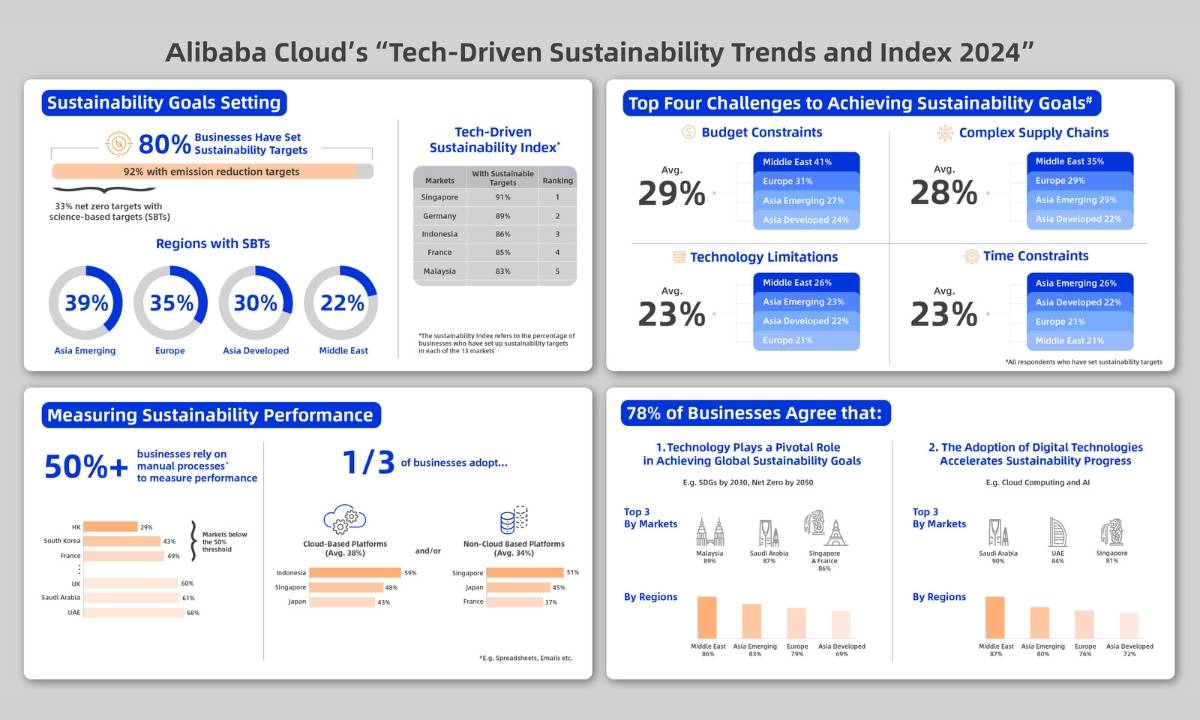
Photo credit: Shutterstock
Despite 80% of businesses setting ambitious green goals, traditional measurement tools like spreadsheets and emails still dominate their sustainability efforts, which could slow progress and undermine environmental impact, according to a new Alibaba Cloud report released on World Energy Saving Day.
While 80% of businesses have established sustainability targets, the survey reveals that 53% still rely on traditional measurement techniques, such as emails and spreadsheets. Only about one-third utilize digital tools, including cloud-based platforms.
“The survey findings underscore the urgent need for organizations to reassess their sustainability measurement methodologies and embrace advanced technological solutions like cloud-based platforms and AI services,” said Selina Yuan, President of International Business at Alibaba Cloud Intelligence.
Sustainability Index: Singapore, Germany, and Indonesia Lead
The report titled “Tech-Driven Sustainability Trends and Index 2024” introduced a sustainability index that ranks markets based on the percentage of businesses setting sustainability targets. Singapore emerged as the front-runner with the highest sustainability index score of 91%, followed closely by Germany at 89% and Indonesia at 86%.
This sustainability index reflects the percentage of businesses that have set sustainability targets in the 13 markets surveyed. As a tool, it enables businesses to gauge their standing and identify areas for improvement.
Commissioned by Alibaba Cloud, the report was conducted by Yonder Consulting with support from The Purpose Business, analyzing responses from 1,300 executives across various sectors, including technology, finance, healthcare, transportation, retail, and manufacturing.

Emerging Asian Markets Set the Pace for SBT Adoption
Among businesses with sustainability targets, a strong commitment to sustainable practices is evident, with 92% aiming to reduce emissions. However, only one-third have committed to science-based targets (SBTs), which are crucial for achieving net-zero emissions.
On average, businesses in emerging Asian markets, such as Malaysia, the Philippines, and Indonesia, show a higher willingness to adopt SBTs, at 39%, compared to their counterparts in developed Asian markets like Singapore, Japan, Europe, and the Middle East.
Key Challenges to Sustainability Progress
A diverse range of motivations drives these sustainability initiatives. For instance, 56% cite aspirations for business growth, while 54% emphasize regulatory compliance. Additionally, 49% attribute their sustainability efforts to a strong corporate culture focused on environmental responsibility.
Despite these commitments and motivations, significant barriers remain. Budget constraints are a major concern for many organizations, impacting 29% of respondents—especially pronounced in Europe (31%) and the Middle East (41%). Complex supply chains hinder progress for 28% of organizations, while technology limitations affect another 23%.
Digital Solutions: The Key to Unlocking Sustainability Goals
A noteworthy 78% of surveyed businesses recognize that digital technology is essential for achieving sustainability goals. The same majority believes cloud computing and AI can greatly accelerate progress, with Saudi Arabia, the UAE, and Singapore leading the adoption of these technologies.
However, the shift toward digital tools for sustainability measurement remains limited. Currently, only about one-third of organizations utilize such technologies, including cloud-based platforms, although Indonesia leads with 59%.
“These digital tools not only streamline the measurement process but also provide actionable insights that can drive meaningful progress in sustainability,” Yuan added, referencing Energy Expert, a cloud-based solution at Alibaba Cloud that uses AI algorithms to help enterprises measure and analyze carbon emissions and energy consumption. So far, the solution has served more than 3,000 organizations globally.




